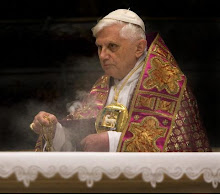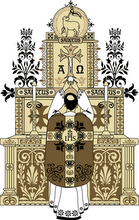
Wednesday 31 October 2007
John Henry Newman - All Saints Day

Tuesday 30 October 2007
There's Something About Jesus, I
Beginning our series of excerpts from Pope Benedict's book Jesus of Nazareth. Jesus' wisdom does not proceed from learning, but from His constant dialogue with the Father:
Jesus' teaching is not the product of human learning, of whatever kind. It originates from immediate contact with the Father, from "face-to-face" dialogue - from the vision of the one who rests close to the Father's heart. It is the Son's word. Without this inner grounding, his teaching would be pure presumption. That is just what the learned men of Jesus' time judged it to be, and they did so precisely because they could not accept its inner grounding: seeing and knowing face-to-face.
Again and again the Gospels note that Jesus withdrew "to the mountain" to spend nights in prayer "alone" with his Father. These short passages are fundamental for our understanding of Jesus: they lift the veil of mystery just a little; they give us a glimpse of Jesus' filial existence, into the source from which his action and teaching and suffering sprang ... (p. 7)
Final causation

Quinta via sumitur ex gubernatione rerum. Videmus enim quod aliqua quae cognitione carent, scilicet corpora naturalia, operantur propter finem, quod apparet ex hoc quod semper aut frequentius eodem modo operantur, ut consequantur id quod est optimum; unde patet quod non a casu, sed ex intentione perveniunt ad finem. Ea autem quae non habent cognitionem, non tendunt in finem nisi directa ab aliquo cognoscente et intelligente, sicut sagitta a sagittante. Ergo est aliquid intelligens, a quo omnes res naturales ordinantur ad finem, et hoc dicimus Deum.
The fifth way is taken from the governance of the world. We see that things which lack intelligence, such as natural bodies, act for an end, and this is evident from their acting always, or nearly always, in the same way, so as to obtain the best result. Hence it is plain that not fortuitously, but designedly, do they achieve their end. Now whatever lacks intelligence cannot move towards an end, unless it be directed by some being endowed with knowledge and intelligence; as the arrow is shot to its mark by the archer. Therefore some intelligent being exists by whom all natural things are directed to their end; and this being we call God.
The Vocation to Blog

Cardinal Ruini, vicar of the Diocese of Rome and leading ally of Pope Benedict, has turned his thoughts to bloggers.
"I don’t understand the Internet, but especially young religious ought to enter blogs and correct the opinions of the youth, showing them the true Jesus.”
Countering the hermeneutic of rupture

But it doesn't mean that. Secundum est quod sequitur. The secondary is what follows. So procreation and the perfecting of the spouses are joint goals, with the latter flowing out of the former. It's about order, not importance. (Think of the processions that exist in the Trinity, for example; the processions are crucial doctrinally, - the Spirit must be seen to proceed from the Word, not vice versa- but the Persons are co-equal.)
The Church had a beautiful understanding of the sacrament of matrimony before the Council, perhaps best shown by Pope Pius IX's inspiring encyclical Casti Connubii (1930).
That's more like it

Sunday 28 October 2007
John Henry Newman - 30th Sunday of the Year (C)

The Pharisee and the Tax Collector (Luke 18:9-14)
Now all of us are sinners, all of us have need to come to God as the Publican did; every one, if he does but search his heart, and watch his conduct, and try to do his duty, will find himself to be full of sins which provoke God's wrath. I do not mean to say that all men are equally sinners; some are wilful sinners, and of them there is no hope, till they repent; others sin, but they try to avoid sinning, pray to God to make them better, and come to Church to be made better; but all men are quite sinners enough to make it their duty to behave as the Publican. Every one ought to come into Church as the Publican did, to say in his heart, "Lord, I am not worthy to enter this sacred place; my only plea for coming is the merits of Jesus Christ my Saviour."
Acknowledgements
The selections I propose to be giving each Sunday are based upon Fr James Tolhursts's book, The Newman Compendium for Sundays and Feastdays (Gracewing)
For the text I am in the debt of those who have produced newmanreader.org.
Ghosts and G. K. Chesterton

Children are sometimes - especially around the age of thirteen - more interested in ghosts than in God. Chesterton's position - "I do not see ghosts; I only see their inherent probability" seems to me an entirely sensible one. I am agnostic about ghosts; but a defender of them in theory. Do people agree with me?
Chesterton, it is fair to say, is a defender of popular superstition, which he saw as the rich soil of true religion. This all ties in with Chesterton's view of the middle ages. With Hallow E'en coming up this seems especially timely:
If we ever get the English back on to the English land they will become again a religious people, if all goes well, a superstitious people. The absence from modern life of both the higher and lower forms of faith is largely due to a divorce from nature and the trees and clouds. If we have no more turnip ghosts it is chiefly from the lack of turnips.The first quote is from Tremendous Trifles, the latter is from Heretics.
Prayers

If I have taught anything false, I leave correction of it to the Roman Church.
It has always struck me that as a teacher of religious doctrine in a Catholic school, I am subject to the local bishop, who should take pains that I teach right doctrine. I wonder what procedures exist to ensure this.
The prayer book is nicely produced and very affordable. For English readers, it can be bought here.
The True Teacher: the Word in the Spirit

"In the Catholic system ... the true teacher is the universal spirit, that is, the divine Word, "that enlightens every man coming into the world" (John 1:9), and manifests natural truth; but this Spirit is other than the human spirit and transcends the latter, whereas the modern pedagogy holds that there is no transcendence of Spirit over spirit, or of truth over the intellect or of teacher over pupil."
Iota Unum, ch. 12, para 127.
For a recent article on Amerio, see here.
Realism, or capitulation? And what about Knox?
 Photo credit: Andrew Cusack
Photo credit: Andrew CusackWas I right to compromise? I need an online edition that is suitable for young pupils whose levels of literacy are not high enough for the D-R version. The Knox translation must be out of copyright soon? Ronald Knox died in 1957 + 50 years = 2007. Or will the copyright extend to 70 years after his death?
What is religious education? Romano Amerio visited

reformed pedagogy....."
There's Something About Jesus

Surely every religious studies teacher of any faith must read Pope Benedict's book, Jesus of Nazareth. Reading this book is a great reminder of the primacy of the person of Christ in religious education. Everything else is secondary, in the sense of flowing out from Him. This book helps us to re-source our instruction to the incarnate Word.
As a teacher I find myself sometimes teaching more about the pope than about Christ. Perhaps this is because it is easier to do so. To teach well about Christ is incredibly difficult, but in Pope Benedict's 'personal search for the face of the Lord' we have a great resource.
In a sense the work is incomplete: This volume takes us up to the Transfiguration, and the pope is currently working on the next installment.
In subsequent posts I will give passages from the book that I have found especially illuminating and plan to use in the classroom.
Church History resource

Catholics on the Design Argument

Note that whilst Haldane backs ID, Finigan backs evolution, saying that ID falls back on a weak 'God of the Gaps' argument.
Saturday 27 October 2007
The Scope of Catholic Education

Pope Pius XI, Divini illius magistri (1929)





